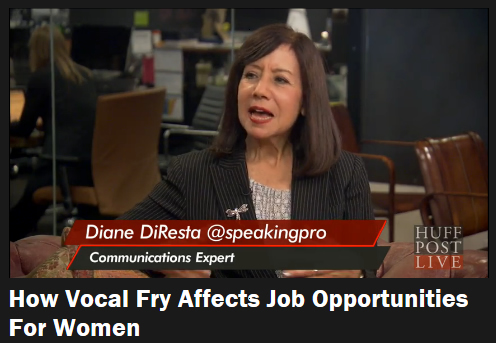Even the most professional women may encounter unwanted advances when least expected. The best defense is to have a strategy.
Success Means Never Having to Say You're Sorry
 Love Story was a popular move in 1970. It starred Ryan O'Neill and Ali McGraw. In one scene they have a fight and go their separate ways. O'Neill finds McGraw after he cools off and apologizes for the fight. She stops him and says through her tears, "Love means never having to say you're sorry." I don't know if most people in conflict would agree with that.
What people may agree with is the overuse of the word "Sorry" in the workplace. This is especially prevalent among women. When I speak to organizations about executive presence and confidence, I advise women to avoid weak speak or what I call wimpy words. Certain modifiers such as "only," or "just" weaken conviction. That is, the speaker negates everything that follows the words "only" or "just". For example, "This is just an idea," is less powerful than saying "This is an idea."
Love Story was a popular move in 1970. It starred Ryan O'Neill and Ali McGraw. In one scene they have a fight and go their separate ways. O'Neill finds McGraw after he cools off and apologizes for the fight. She stops him and says through her tears, "Love means never having to say you're sorry." I don't know if most people in conflict would agree with that.
What people may agree with is the overuse of the word "Sorry" in the workplace. This is especially prevalent among women. When I speak to organizations about executive presence and confidence, I advise women to avoid weak speak or what I call wimpy words. Certain modifiers such as "only," or "just" weaken conviction. That is, the speaker negates everything that follows the words "only" or "just". For example, "This is just an idea," is less powerful than saying "This is an idea."
Related to these two modifiers is the word "sorry". To use the word "sorry" in emails and spoken language is to the detriment of women. An apologetic communication style sabotages leadership and authority. Leaders are perceived as decisive and willing to take a risk. Saying "sorry' too frequently is a way to avoid taking a stand and not be taken seriously.
The word "sorry" is also used as a substitute for "excuse me". Instead of asking the speaker to clarify or repeat, some women will say "Sorry?" rather than use the more effective phrase, "Excuse me?".
There's an app for that
How can women rid this undermining word from their vocabulary? The first step is awareness. Technology to the rescue! Now there is an app that identifies wimpy words when they are used in emails.
The Just Not Sorry extension for Chrome is downloadable at the Chrome app store. The app identifies wimpy words in Gmail by underlining them in red and providing explanations of how the word weakens the message in the email. Whether the reason for using wimpy words is a subconscious lack of confidence or simply a bad habit, this tool can create conscious awareness for women so that they can become more successful leaders and communicators.
After all, success means never having to say you're sorry.
Vocal Fry Can Hurt Your Presentation and Job Interview
 Does your voice crackle like bacon? You may have vocal fry. Vocal fry is sweeping the nation. This creaky vocal pattern, also known as croaking, is a low vocal pitch that's often heard at the end of a sentence. It's prevalent among women and this pattern of public speaking is becoming a form of peer identity for the millennial generation. Kim Kardashian, Brittney Spears, and other young celebrities have popularized this form of speaking. In one study, vocal fry was noted in two thirds of college students. However popular, vocal fry communicates a negative impression and doesn't serve professionals who want to be taken seriously in the workplace.
Not only is vocal fry an irritating sound for a public speaker; it can also be deadly in a job interview.
Does your voice crackle like bacon? You may have vocal fry. Vocal fry is sweeping the nation. This creaky vocal pattern, also known as croaking, is a low vocal pitch that's often heard at the end of a sentence. It's prevalent among women and this pattern of public speaking is becoming a form of peer identity for the millennial generation. Kim Kardashian, Brittney Spears, and other young celebrities have popularized this form of speaking. In one study, vocal fry was noted in two thirds of college students. However popular, vocal fry communicates a negative impression and doesn't serve professionals who want to be taken seriously in the workplace.
Not only is vocal fry an irritating sound for a public speaker; it can also be deadly in a job interview.
Women job applicants who presented themselves with vocal fry were perceived as less competent, less educated, and less trustworthy. To learn more, watch my interview with Nancy Redd on Huffington Post Live:
The Laughter of Leadership
We've heard about managing by walking around. We've heard about leading by storytelling. But can you laugh your way to leadership? It turns out that laughter is an important leadership and presentation skill. But when it comes to humor in the workplace men are more skilled than women.
Judith Baxter, professor of applied linguistics at Aston University in the U.K, studied how men and women use language. She observed men and women who were leading high level meetings. Baxter found women to be less at ease using humor. 80% failed when attempting to be humorous and sometimes derailed as a result. In contrast, Professor Baxter observed that 90% of men's humor got a laugh. This reminds me of the numerous times women have told me that their ideas aren't taken seriously. Yet, when a man presents the same idea minutes later, it's enthusiastically embraced.
Are men naturally funnier than women? Baxter didn't answer that question, postulating instead, that culture plays a role. We expect men to be funny but don't have the same expectation of women. Teasing and one-upmanship resulted in laughter from men, but it was risky for women to use the same tactics. When I speak to women leaders, it's been my experience that women don't take enough credit for their accomplishments and speak in more self deprecating terms. Motivational speaker Tony Robbins contrasted the male one-upmanship communication style with the female pattern, which he dubbed 'one-downmanship'.
In addition to cultural expectations, Baxter cited minority status as another reason for this difference in effective use of humor. She observed an 80/20 male-to-female ratio in the meetings she attended. Being in the minority made some women defensive and less relaxed. An interesting turn of events occurred in meetings with middle managers. When the meetings were more gender balanced or contained more women, the women got more laughs.
So could lack of female confidence once again be at the core of this gender difference in humor? Is this one of the reasons women get stuck in middle management? Is humor the missing key to leadership advancement? Speaking may be the new competitive advantage but humor may be the leadership edge.
What's been your experience? Should women leaders study stand-up comedy?
2013 New York Conference Where Business Opportunities Happen
 I am very excited to be on the LEXCI Business Expert panel at the Women's Leadership Exchange NYC conference on Tuesday, October 15th, 2013. Please join me and celebrate with other women business owners like yourself. You will get the knowledge, support and connections to help you leap hurdles to real growth at the WLE Conference. Register today to hear from top business professionals who will share their secrets to success.
I am very excited to be on the LEXCI Business Expert panel at the Women's Leadership Exchange NYC conference on Tuesday, October 15th, 2013. Please join me and celebrate with other women business owners like yourself. You will get the knowledge, support and connections to help you leap hurdles to real growth at the WLE Conference. Register today to hear from top business professionals who will share their secrets to success.
Dianne Budion-Devitt Moderator
Diane DiResta Panelist President, DiResta Communications Inc.
Darcy Ann Flanders Panelist Baseline Group NY
Rika Keck Panelist NY Integrated Health, LLC
Beth Neuhaus Panelist Chief Corporate Counsel, The Hamburger Law Firm
View the complete conference agenda here.
Be Inspired and Learn From the Best: - Lori Greiner, QVC/Shark Tank, WLE Compass Award Winner - Colonel Maria del Pilar Ryan, Ph.D., WLE Compass Award Winner - Sharon Melnick, Ph.D., CEO, Horizon Point, Inc. - Sue Malone, Founder Strategies For Small Business, Number one SBA loan provider - Jane Hanson, Partner, The Media Masters - Susan Solovic, The Small Business Expert
For a complete list of speakers, click here.
WLE would like to offer you a special discount. Use EARLYBIRD in the promotion code box and the conference will only be $99 (regular price $129). It includes continental breakfast and luncheon. This discount will only be available until September 9th. Don't miss out on this opportunity. REGISTER NOW! Hoping to see you on October 15th.
NYC Conference Location : MetLife Building 1095 Sixth Ave, New York, NY 10036
PS. Forward this letter to other women business owners or professionals who are serious about growing their businesses, too! With your recommendation, we will offer them this special discount.
For Details: www.womensleadershipexchange.com
Sponsored By: Media Partner:
American Express OPEN Glow Magazine
Are You Seen But Not Heard?
Karen was newly appointed to her position in finance, where she was responsible for managing and keeping the department on budget. Soft-spoken and petite, Karen had a hard time making herself heard during meetings, as her aggressive team shouted over her and challenged her when she questioned their figures...
Is Professional Speaking a Male-Dominated Industry?
Do Women Need to Speak More Powerfully Than Men?
 In honor of Women's History Month, I thought I'd explore this issue of women speaking powerfully. It's been established that men and women communicate differently. The question is, do women need to speak more powerfully than men to be heard? Whether it's a speech, pitching an idea, or a one-on-one meeting, it appears that women need to work harder to have their ideas heard.
According to New York Women in Communications, women make up 3% of CEOs and occupy around 16% of board seats at the nation's Fortune 500 companies, and 15.2% of the directors at the largest companies are women.
In honor of Women's History Month, I thought I'd explore this issue of women speaking powerfully. It's been established that men and women communicate differently. The question is, do women need to speak more powerfully than men to be heard? Whether it's a speech, pitching an idea, or a one-on-one meeting, it appears that women need to work harder to have their ideas heard.
According to New York Women in Communications, women make up 3% of CEOs and occupy around 16% of board seats at the nation's Fortune 500 companies, and 15.2% of the directors at the largest companies are women.
A female professor at NYU received a request for a testimonial from a former student. The letter was over the top. So much so, she had to tone it down so it would sound realistic. It was no surprise to her that this communication came from a male. She realized that males tend to exaggerate their abilities, while women downplay their accomplishments and speak with less conviction.
I can corroborate this from my own experience coaching women leaders. Women have a more difficult time taking a strong position, speaking with authority, and promoting their own ideas. While coaching one executive woman, it was apparent that her area was the most profitable in the business, but her influence was a well-kept secret. We immediately got to work increasing her visibility: getting her name in trade publications, networking internally and externally, and booking speaking engagements.
Public speaking levels the playing field for women.
Here are some ways women can speak more powerfully:
- Lower their pitch.
- Put a stake in the ground.
- Use specific, definitive language.
- Negotiate with confidence.
- Work with a coach.
So I ask you, in your experience, do women need to speak more powerfully than men? Can they best learn to speak powerfully from a male or a female role model?
Political Presentations: The Double Standard Continues
 In June, I blogged about Michele Bachmann and the double standard for women politicians. It seems that the media continues to display sexism toward women candidates. Whether it's Hillary Clinton, Sarah Palin, or Michele Bachmann there seems to be an element of sexism even as we approach 2012.
First we had to hear the commentary each time Hillary had a new hairstyle. While this may be appropriate for a First Lady, when a woman is running for political office she ought to be taken more seriously. How often do we critique a male candidate's hair? (Donald Trump doesn't count).
In June, I blogged about Michele Bachmann and the double standard for women politicians. It seems that the media continues to display sexism toward women candidates. Whether it's Hillary Clinton, Sarah Palin, or Michele Bachmann there seems to be an element of sexism even as we approach 2012.
First we had to hear the commentary each time Hillary had a new hairstyle. While this may be appropriate for a First Lady, when a woman is running for political office she ought to be taken more seriously. How often do we critique a male candidate's hair? (Donald Trump doesn't count).
During the Republican debates, Michele Bachmann was accused of not knowing her facts - even when she did. In one debate, she bested Newt Gingrich regarding his involvement in Fannie Mae, yet the media did not make much of her win.
The most recent sexist remark was by John McLaughlin of the McLaughlin Group when he said we have a "Gal Candidate". A GAL? A friend asked me if I would find it offensive if his 87 year old father referred to a woman as a gal. I replied, "No. He's a product of his times. But a journalist and moderator knows better. He's on national TV and is subject to professional standards. He didn't refer to 'guy candidates'".
Language is a mirror into how one thinks. It's difficult to be taken seriously as a woman candidate when you're called a "gal". It's amazing that this kind of double standard is going on in the U.S., when other countries have elected a woman president or prime minister.
As a public speaker and debater, Michele Bachmann has handled herself well by sticking to the facts and not showing a lot of emotion. Will gender always be a factor? Is it possible to evaluate the candidates on their merits, without considering gender? Or will it always color our perceptions?
Political Presentations: Is There a Double Standard for Women?
 First there was Sarah Palin. I don't have to review the mistakes she made. They're burned in our brains because she was skewered by the media and the focus of a comedy bit on Saturday Night Live. Enter Michele Bachmann. Her recent flub about the actor John Wayne being from her hometown of Waterloo, Iowa set off the media because it was actually serial killer, John Wayne Gacey who hails from Waterloo. Oops. Yes, politicians must check their facts before speaking to the media and when they're wrong they'll have to answer for it. But is the scrutiny of Sarah Palin and Michele Bachmann due to their party affiliation? I say no. Hillary Clinton was not spared the media rod. She was criticized for her changing hair styles, her shrill voice, her command and control approach and her outspoken comments. Yet, these women pale compared to the gaffes of Joe Biden. But he seems to get a pass. The media does a quick "boys will be boys" chuckle and moves on to the next story. Like teflon, Joe's many public speaking faux pas including the F word don't seem to stick.Last week, Chris Wallace of Fox News Sunday asked Michele, "Are you a flake?" Her response was, "Well, I think that would be insulting, to say something like that, because I'm a serious person." Can you imagine asking a male candidate if he was a flake? He then went on to remind her "that now that you are in the spotlight in a way that you weren't before that you have to be careful and not say what some regard as flaky things." How condescending but not surprising. The experience of political women mirrors the reality of corporate senior women who are not taken as seriously as their male counterparts. Tired of bumping their heads on the glass ceiling many corporate women left to become entrepreneurs and fueled the rapid growth of women owned businesses. But what is the answer for female political leaders? Are they supposed to go off and form their own governments? We need the diversity in both the private and public sector. Women have led England, the Philippines, Nicaragua, Pakistan. It's 2011 and we still don't have a female American president.
Is there a double standard for women candidates? Do women have to be perfect presenters? What do you think?
First there was Sarah Palin. I don't have to review the mistakes she made. They're burned in our brains because she was skewered by the media and the focus of a comedy bit on Saturday Night Live. Enter Michele Bachmann. Her recent flub about the actor John Wayne being from her hometown of Waterloo, Iowa set off the media because it was actually serial killer, John Wayne Gacey who hails from Waterloo. Oops. Yes, politicians must check their facts before speaking to the media and when they're wrong they'll have to answer for it. But is the scrutiny of Sarah Palin and Michele Bachmann due to their party affiliation? I say no. Hillary Clinton was not spared the media rod. She was criticized for her changing hair styles, her shrill voice, her command and control approach and her outspoken comments. Yet, these women pale compared to the gaffes of Joe Biden. But he seems to get a pass. The media does a quick "boys will be boys" chuckle and moves on to the next story. Like teflon, Joe's many public speaking faux pas including the F word don't seem to stick.Last week, Chris Wallace of Fox News Sunday asked Michele, "Are you a flake?" Her response was, "Well, I think that would be insulting, to say something like that, because I'm a serious person." Can you imagine asking a male candidate if he was a flake? He then went on to remind her "that now that you are in the spotlight in a way that you weren't before that you have to be careful and not say what some regard as flaky things." How condescending but not surprising. The experience of political women mirrors the reality of corporate senior women who are not taken as seriously as their male counterparts. Tired of bumping their heads on the glass ceiling many corporate women left to become entrepreneurs and fueled the rapid growth of women owned businesses. But what is the answer for female political leaders? Are they supposed to go off and form their own governments? We need the diversity in both the private and public sector. Women have led England, the Philippines, Nicaragua, Pakistan. It's 2011 and we still don't have a female American president.
Is there a double standard for women candidates? Do women have to be perfect presenters? What do you think?
Sexism and Sarah Palin's Voice
 This morning as I was watching Morning Joe on TV, a clip was played of Sarah Palin. http://www.msnbc.msn.com/id/3036789/#39684087
This morning as I was watching Morning Joe on TV, a clip was played of Sarah Palin. http://www.msnbc.msn.com/id/3036789/#39684087
The discussion was facilitated by Mike Barnicle who asked that the clip be played again, but this time we should listen to the tone. After listening for a second time, Barnicle asked the group, "Do you want to listen to that for four years?" While I agree that Palin sounded a little shrill and high pitched, that was not the issue. The issue was the way the question was asked. Barnicle's question was judgmental. Let's ask it a different way. "What do you think of her voice? Do you think she loses credibility? How will that impact her on the campaign trail?"
This is a different kind of question and a valid one at that. The voice is 38% of the message according to a UCLA study. The meta message is in the tone and not the words. Hillary Clinton lost credibility when she gave vent to her anger and passion in the form of an escalating tone. She has since found her voice. Men have an advantage over women in the vocal arena. A deeper or lower pitched voice will be perceived as more authoritative. While using the upper range of her pitch level doesn't serve a woman candidate, it seems that there's a double standard when it comes to men.
Former Mayor Koch of New York City has a nasal sounding voice and uses /um/ after almost every other word. This is how he spoke during his administration and he still uses this speaking style. Yet, we didn't hear comments such as "Could you listen to him for another four years?"
The points made during the discussion regarding tone were valid. What some people don't get is that there is a tone to language. And I heard an element of sexism in Barnicle's comment. What do you think?
Are You Seen But Not Heard?
 Situation: Karen was newly appointed to her position in finance, where she was responsible for managing and keeping the department on budget. Soft-spoken and petite, Karen had a hard time making herself heard during meetings, as her aggressive team shouted over her and challenged her when she questioned their figures. Karen's team was over budget, and she was concerned about her credibility when she had to present her figures to corporate at an up-coming meeting. Recognizing the importance of asserting her authority, Karen sought coaching to increase her confidence and to learn strategies for maintaining control.
Solution: We worked on increasing the volume and conviction in Karen's voice. Initially, she wasn't aware of her vocal range and didn't believe she could project. Together, we practiced breathing exercises before the meeting to calm Karen's nerves. With a specially created template, Karen began to organize her ideas so she would not get intimidated and lose her train of thought. Karen also developed strategies for dealing with people who lobbed hostile barbs or tried to interrupt her when she was speaking.
Situation: Karen was newly appointed to her position in finance, where she was responsible for managing and keeping the department on budget. Soft-spoken and petite, Karen had a hard time making herself heard during meetings, as her aggressive team shouted over her and challenged her when she questioned their figures. Karen's team was over budget, and she was concerned about her credibility when she had to present her figures to corporate at an up-coming meeting. Recognizing the importance of asserting her authority, Karen sought coaching to increase her confidence and to learn strategies for maintaining control.
Solution: We worked on increasing the volume and conviction in Karen's voice. Initially, she wasn't aware of her vocal range and didn't believe she could project. Together, we practiced breathing exercises before the meeting to calm Karen's nerves. With a specially created template, Karen began to organize her ideas so she would not get intimidated and lose her train of thought. Karen also developed strategies for dealing with people who lobbed hostile barbs or tried to interrupt her when she was speaking.
Result: After the big meeting, Karen said she felt prepared, organized, and confident. She was able to hold her ground and support her position. The note-taking system helped her to stay focused and maintain her credibility.
Do you know people who get lost in the crowd? We can help them rise above the noise, find their voice, and communicate with confidence.
China Surpasses United States in the Number of Women Entrepreneurs, Says Communications Expert Diane DiResta
It's small business week. Do you know how women entrepreneurs are doing? Diane DiResta, owner and CEO of DiResta Communications, attended the Global Summit of Women May 20-22 at the Marriott City Wall Hotel in Beijing and reports that there are more women entrepreneurs in China than the entire United States population at 300 million. The Global Summit of Women celebrated its 20th year with the theme, "Women at the Forefront of Change." The annual conference, headed by Irene Natividad, is unique in that it brings together government leaders, Non-Governmental Organizations (NGOs), corporations and entrepreneurs who are committed to improving women's economic status worldwide. The conference attracted 1000 women from around the world with Mongolia being the largest group. Presentations were in English and Chinese.
Prior to the summit DiResta was invited to a briefing and reception at the United States Embassy. The panel concurred that the key to doing business with the Chinese is building lasting relationships. Professor Qing qi' Shir stated that despite the extraordinary number of Chinese women entrepreneurs, the number one roadblock for Chinese women business owners is access to capital and the primary source of information and technology is the Internet. She shared that 97% are optimistic about the economic future. China had a 9.8% growth rate during the financial crisis.
Some of the speakers included: The honorable Nguyen Thi Doan, Vice President of Vietnam, First Lady Salma Kikwete of Tanzania, Hon. Maud Olofsson, Deputy Prime Minister, Sweden, and Cheng Hong, Vice Mayor of Beijing. A highlight of the conference was the introduction of the first Saudi woman to become a government representative. Social, economic and political leadership issues were discussed. In Tanzania, for example, getting tested for HIV is a stigma so the First Lady stepped up and got tested in public.
The conference provided an economic opportunity for local women who could set up a booth and sell their jewelry and wares.
Ms. DiResta, who is an International speaker and public speaking strategist, stated "The conference shattered myths and misconceptions we have of each other. I was surprised when two women from Oman sat next to me and invited me to two of their conferences. I didn't realize there were so many women entrepreneurs." One woman changed her opinion about Americans when she met someone from the U.S. who could speak several languages.
Across cultures, a major universal issue still remains: Women are underrepresented on boards, as corporate CEOs, and in getting funded.
Next year's conference will be held in May 2011 in Istanbul, Turkey.
Press Release: Women in Power: Are You Living On Purpose?
Westport, CT (1/21/2010): Diane DiResta, top speaking strategist and founder and CEO of DiResta Communications, a communication skills consulting company, was invited to be one of four panelists, all successful women entrepreneurs, at the Women in Power networking event on Wednesday at the Westport Woman's Club. DiResta and fellow panel members discussed how to increase passion in the areas that matter most to business - Business Planning, Communications Impact, Financial Strategies, and Networking that works. The theme was "Living on Purpose: The Foundations for Successful Business Building in Today's Market." Halfway through the program, DiResta directed the 200 women in the audience to spend three minutes networking with each other. Soon the hall was abuzz with purposeful conversations and exchanges of business cards. The exercise was so successful that WIP member-moderator Lisa Wexler, an attorney-turned radio personality, was challenged to end it. "Women are excellent networkers," DiResta remarked.
Lisa Wexler, Women In Power member, moderated the session. Other panelists were: Kathy Caprino, Founder and President of Ellia Communications, Anne Evans, District Director, US Department of Commerce, and Kathy McShane, Founder and CEO of The Kendrew Group.
As CEO of DiResta Communications, Inc., Diane DiResta has trained spokespersons in sports and entertainment such as NBA players and Vanna White, as well as physician spokespersons representing pharmaceutical companies who want to communicate with maximum impact — whether face-to-face, in front of a crowd, or from an electronic platform. In addition to her corporate clients, DiResta developed a Confidence Class for seventh grade girls in Staten Island for two years. “I can’t think of a better investment than to invest in communication and we need to start early,

